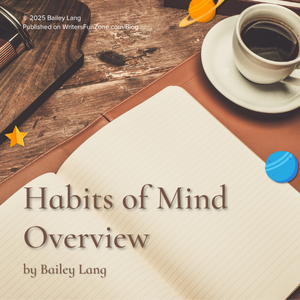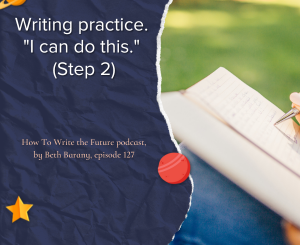Habits of Mind Overview by Bailey Lang
 Today we welcome a new guest writer to Writer’s Fun Zone, Bailey Lang who is stopping by to chat with us about “Habits of Mind Overview.” Enjoy!
Today we welcome a new guest writer to Writer’s Fun Zone, Bailey Lang who is stopping by to chat with us about “Habits of Mind Overview.” Enjoy!
***
By now, we’ve all heard enough about writing habits that we could probably recite the advice in our sleep — write every day, build a consistent schedule, and free-write if we’re feeling stuck.
A lot of it is good advice, but a lot of it also tends to miss a crucial component.
We’re going to talk about that component over the next few months. We’re going to talk about habits of mind.
When we think of a writing habit, we typically think of an external activity, like sitting down to write in the morning.
We might experience an internal cue (or a phone alarm with a reminder) and the glow of having completed a habit loop, but most of our attention is on the star of the show: the habit.
Habits of mind are different, but they are crucially important for building and maintaining a writing practice. I should know: I wrote my whole dissertation on habits of mind, and there’s an extensive body of research demonstrating their importance to writing.
What is a Habit of Mind?
Before we get into all that, though, what exactly is a “habit of mind”?
Unlike what we typically think of when we think about habits — external activities — a habit of mind is a thinking practice.
Habits of mind are a way of engaging with a pursuit (like writing!) that blends the intellectual and the practical.
You can think of the habits of mind as both foundation and scaffolding for the writing practice you’re trying to build.
All the writing activities you do will be shaped, first and foremost, by what’s going on with your mental habits.
How you think determines what you do and how well it goes.
As writers, we benefit from attending to our habits of mind as much as our external writing habits.
Focusing on the habits of mind enables us to:
- Improve our craft
- Strengthen our critical thinking skills
- Assess and improve our writing practices
- Enhance our ability to analyze writing (our own and others’)
- Deepen our knowledge of genre conventions and other features of writing
That’s not too shabby!
Plus, in an era where research into generative AI is already showing detrimental effects on users’ critical thinking skills, fortifying our habits of mind is one way to fight over-reliance on machine-based writing practices.
We’ll return to this theme throughout the series as we explore how our habits of mind can keep us rooted in and creating from uniquely human perspectives.
What are the Best Habits of Mind for Writers?
With writing, we can get granular about what habits of mind to focus on. Research produced by the Council of Writing Program Administrators, the National Council of Teachers of English, and the National Writing Project identified eight core habits of mind that are central to successful writing.
Although these organizations focus primarily on college writing, habits of mind matter far beyond the classroom.
My research into habits of mind — an archival study of women’s non-academic writing practices in the late 19th and early 20th centuries — bears this out, as traces of these mental habits appear in their diaries, letters, and other documents.
Our habits of mind show up at school, at work, in our creative practices, and throughout our lives.
Whether you’re a first-year college student writing an essay or a seasoned novelist working on an epic fantasy series, your habits of mind are part of the picture.
What habits of mind should writers focus on?
- Curiosity — The desire to know more about the world.
- Openness — The willingness to consider new ways of being and thinking in the world.
- Engagement — A sense of investment and involvement in learning.
- Creativity — The ability to use novel approaches for generating, investigating, and representing ideas.
- Persistence — The ability to sustain interest in and attention to short- and long-term projects.
- Responsibility — The ability to take ownership of one’s actions and understand the consequences of those actions for oneself and others.
- Flexibility — The ability to adapt to situations, expectations, or demands.
- Metacognition — The ability to reflect on one’s thinking as well as on the individual and cultural processes used to structure knowledge.
Coming up
These definitions come from the Framework for Success in Postsecondary Writing, and they’ll guide the upcoming posts, where we’ll dig into each habit of mind in turn.
In each post, we’ll explore one habit of mind in depth — what it means for writers, how it might show up in your writing practice, why it matters, and a practical exercise or two to kick-start your new habits.
I’ll also include reading recommendations, links to resources, and more.
Reading Recommendations
- The Framework for Success in Postsecondary Writing — Learn about the habits of mind we’ll discuss over the next eight posts.
- Nowhere is Straight Work More Effective: Women’s Participation in Self-Culture — If you really want to earn your nerd bona fides, you can read my dissertation!
- Tiny Habits by BJ Fogg and Atomic Habits by James Clear — Two books to read for when your external habits need a bit of a boost. (Affiliate links)
- AI Tools in Society: Impacts on Cognitive Offloading and the Future of Critical Thinking — Research into how reliance on generative AI is affecting critical thinking has already begun, and the picture isn’t pretty.
***
About the Author
 Dr. Bailey Lang is a book coach, writer, and editor. At The Writing Desk, they help authors build sustainable, enjoyable writing practices that take their books from draft to done. Bailey has a PhD in rhetoric and writing studies and loves geeking out about writing.
Dr. Bailey Lang is a book coach, writer, and editor. At The Writing Desk, they help authors build sustainable, enjoyable writing practices that take their books from draft to done. Bailey has a PhD in rhetoric and writing studies and loves geeking out about writing.
You can sign up for Bailey’s free newsletter, Word to the Wise, for more writing advice and regular author interviews.






